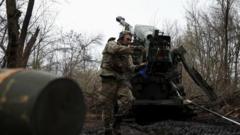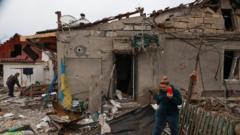A series of suspicious cargo incidents in Europe raised alarms in Washington, prompting urgent communications to Putin in an effort to halt a risky sabotage operation.**
U.S. Officials Act to Avert Russian Air-Cargo Sabotage Threat**

U.S. Officials Act to Avert Russian Air-Cargo Sabotage Threat**
As intelligence reveals potential plots, Biden administration warns Putin to prevent escalation in the ongoing Russia-Ukraine conflict.**
In a high-stakes diplomatic maneuver, the Biden administration made significant efforts to warn Russian President Vladimir V. Putin after U.S. intelligence indicated that a Russian military unit was plotting to deploy explosive devices through air cargo. The warnings came in response to a spate of incidents in which seemingly benign cargo shipments spontaneously ignited at various airports and storage facilities across Germany, Britain, and Poland last summer.
As reports surfaced of these cargo fires, U.S. officials recognized a coordinated sabotage effort. By August, intelligence intercepted discussions among high-ranking officials of the G.R.U., Russia’s military intelligence, suggesting an expansive scheme that might seek to escalate the Ukraine crisis directly onto American soil.
In the Situation Room, President Biden’s aides analyzed critical intelligence regarding test runs of these explosive shipments, which had included inconspicuous items that ignited upon arrival — a small electronic massager was notably among them. With apparent confidence, Russian operatives had reportedly figured out how to bypass air-cargo security procedures, leading to fears that similar packages could soon be en route to the U.S. and Canada, where they could ignite catastrophic fires upon unloading.
While the main focus of the threat was on cargo planes, the possibility that passenger planes might also unknowingly transport smaller packages heightened concern within U.S. security circles. The potential ramifications of these actions are being closely monitored in light of the ongoing geopolitical tensions surrounding the Russia-Ukraine war.
The urgency of the situation underscores not only the volatile nature of the current conflict but also the critical importance of maintaining open channels of communication to prevent escalation into broader confrontations, particularly as the U.S. and its allies continue to prepare their responses to any new aggressions from Moscow.
As reports surfaced of these cargo fires, U.S. officials recognized a coordinated sabotage effort. By August, intelligence intercepted discussions among high-ranking officials of the G.R.U., Russia’s military intelligence, suggesting an expansive scheme that might seek to escalate the Ukraine crisis directly onto American soil.
In the Situation Room, President Biden’s aides analyzed critical intelligence regarding test runs of these explosive shipments, which had included inconspicuous items that ignited upon arrival — a small electronic massager was notably among them. With apparent confidence, Russian operatives had reportedly figured out how to bypass air-cargo security procedures, leading to fears that similar packages could soon be en route to the U.S. and Canada, where they could ignite catastrophic fires upon unloading.
While the main focus of the threat was on cargo planes, the possibility that passenger planes might also unknowingly transport smaller packages heightened concern within U.S. security circles. The potential ramifications of these actions are being closely monitored in light of the ongoing geopolitical tensions surrounding the Russia-Ukraine war.
The urgency of the situation underscores not only the volatile nature of the current conflict but also the critical importance of maintaining open channels of communication to prevent escalation into broader confrontations, particularly as the U.S. and its allies continue to prepare their responses to any new aggressions from Moscow.





















